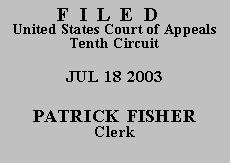

| UNITED STATES OF AMERICA, |
|
| v. | |
| SERGIO ORTEGA-GUZMAN, |
|
Sergio Ortega-Guzman pleaded guilty to unlawfully reentering the United States after deportation for an aggravated felony in violation of 8 U.S.C. §§ 1326(a) and (b)(2). He appeals the district court's denial of his motion to dismiss the indictment and raises an issue regarding his sentence. Counsel appointed to represent defendant on appeal filed a brief pursuant to Anders v. California, 386 U.S. 738 (1967). We affirm the district court's denial of Mr. Ortega-Guzman's motion to dismiss the indictment and we affirm the conviction.
I. BACKGROUND
Mr. Ortega-Guzman, a Mexican citizen, was deported by the United States in August 2001. He had previously been convicted of an aggravated felony in Colorado state court. He subsequently returned to the United States without lawful permission, and, in March of 2002, he was arrested in Weld County, Colorado, where state authorities charged him with driving without a license and without valid insurance. Convicted of both charges, he spent ten days in jail, after which the Immigration and Naturalization Service took him into custody.
The federal government indicted him for violating 8 U.S.C. § 1326(a) and (b)(2), charging that he illegally re-entered the United States after deportation and that he did so after being convicted of an aggravated felony. Mr. Ortega-Guzman moved to dismiss the indictment before trial, claiming that his original deportation proceeding was tainted by a due process violation. The district court denied the motion.
After the district court rejected this motion to dismiss the indictment, Mr. Ortega-Guzman pleaded guilty to the charged offense. His "Rule 11 Plea Statement," which the parties submitted in lieu of a formal plea agreement, was unconditional, that is, it preserved no issues for appeal. The district court accepted Mr. Ortega-Guzman's guilty plea, finding that it met all the requirements set forth in Fed. R. Crim. P. 11. After the district court rejected Mr. Ortega-Guzman's motion for a downward departure, Mr. Ortega-Guzman was sentenced to 57 months' imprisonment.
II. DISCUSSION
Mr. Ortega-Guzman has asked his counsel to appeal the district court's denial of his motion to dismiss the indictment and to challenge the denial of the motion for downward departure. Anders holds that if counsel finds a case to be wholly frivolous after conscientious examination, he should so advise the court and request permission to withdraw. Counsel must in addition submit to both the court and his client a brief referring to anything in the record arguably supportive of the appeal. The client may then raise any points he chooses, and the appellate court thereafter undertakes a complete examination of all proceedings and decides whether the appeal is in fact frivolous. If it so finds, it may grant counsel's request to withdraw and dismiss the appeal. See Anders, 386 U.S. at 744.
Mr. Ortega-Guzman Defendant was notified of his right to file a pro se brief, and he has chosen not to do so. Accordingly, we turn to an examination of the proceedings below to determine if the appeal is wholly frivolous.
In his Anders brief, counsel first dismisses the possibility that the district court erred in denying the motion to dismiss the indictment. As noted above, however, Mr. Ortega-Guzman's plea agreement preserved no issues for appeal. See United States v. Ryan, 894 F.2d 355, 360-61 (10th Cir. 1990) (Rule 11 requires a defendant to reserve the specific issue to be appealed). In the absence of a conditional plea, a defendant who pleads guilty admits to all of the factual allegations contained in the indictment and the legal consequences of those acts. See United States v. Broce, 488 U.S. 563, 569-70 (1989); see also Tollett v. Henderson, 411 U.S. 258, 267 (1973) ("When a criminal defendant has solemnly admitted in open court that he is in fact guilty of the offense with which he is charged, he may not thereafter raise independent claims relating to the deprivation of constitutional rights that occurred prior to the entry of the guilty plea. He may only attack the voluntary and intelligent character of the guilty plea."). Mr. Ortega-Guzman does not challenge the "voluntary and intelligent character" of his guilty plea. See id., 411 U.S. at 267. Consequently, Mr. Ortega-Guzman has no basis for collaterally attacking his deportation proceeding.
Next, Mr. Ortega-Guzman challenges the district court's failure to grant him a downward departure. In so doing, the court clearly recognized that it had the discretion to depart downward but declined to do so. Because the court acknowledged its authority to grant such a departure, we have no jurisdiction to review its decision refusing to exercise that authority. See United States v. Castillo, 140 F.3d 874, 889 (10th Cir. 1998). We have carefully examined the record to ascertain whether any other ground exists to support a challenge to defendant's sentence. We find nothing in the record to indicate that the sentence imposed was in violation of the law or the result of a misapplication of the sentencing guidelines. Accordingly, we are without jurisdiction to consider such a challenge. See United States v. Sanchez, 146 F.3d 796, 796-97 (10th Cir. 1998); 18 U.S.C. § 3742(a).
III. CONCLUSION
Accordingly, we AFFIRM the judgment of the district court denying Mr. Ortega-Guzman's motion to dismiss the indictment, we AFFIRM the conviction, and we GRANT counsel's motion to withdraw.
Entered for the Court,
Robert H. Henry
Circuit Judge
*. This order and judgment is not binding precedent, except under the doctrines of law of the case, res judicata, and collateral estoppel. The court generally disfavors the citation of orders and judgments; nevertheless, an order and judgment may be cited under the terms and conditions of 10th Cir. R. 36.3.